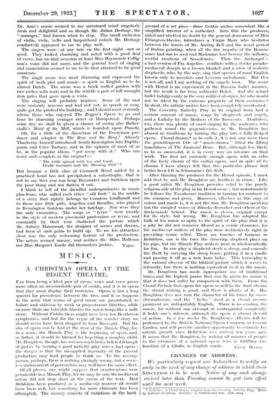THE THEATRE.
TWO PLAYS.
"LOVE IN A VILLAGE" (EVERYMAN, HAMPSTEAD). " THE ROSE AND THE RING " (WYNDHAM'S).
PROBABLY most of the modern audiences who go to see Love in a Village will have Gay's opera in their minds. The plays are very different. Gay is flashing ; he was Swift's friend and Pope's, and he caught something of the brutality of the Dunciad or of Brobdingnag and added it to his own captivating effrontery in the memorable hour when he invented musical comedy.
But Biekerstaffe was Richardson's adapter for the stage, and understood the female heart like his original. He wrote, too, through the 1760's and 'seventies when the age had begun to soften towards Watteau and even Rousseau.
His play is charming and the young ladies in it captivating. They are prudent yet warm-hearted, with the prettiest confidence in each other and the prettiest raillery for their lovers. The plot of the play is the archetypal double intrigue, one of the heroes impersonating a gardener and the other a music master, and one of the heroines a chambermaid.
This plot is very prettily involved and gives the necessary excuses for solos. duets and trios, with a very natural air.
Dr. Arne's music seemed to my untutored mind singularly fresh and delightful and as though Mr. Julian Herbage, the "-arranger," had known when to stop. The small orchestra of violin, viola, 'cello and harpsichord (which Mr. Herbage conducted) appeared to me to play well.
The singers were—at any rate on the first night—not so good. They looked charming and acted with a good deal of verve, but on that occasion at least Miss Raymonde Collig- non's voice did not carry, and the general level of singing and enunciation seemed to me to be that attained to by good amateurs.
The single scene was most charming and expressed the spirit of both plot and music—a spirit so English as to be almost Dutch. The scene was a brick walled garden with two niches with seats and in the middle a pair of tall wrought iron gates that gave upon a vista.
The singing will probably improve. Sonic of the cast were certainly nervous and had not yet, in speech or song, quite got the pitch of the building ; and I should most certainly advise those who enjoyed The Beggar's Opera to go and hear its charming younger sister at Hampstead. Perhaps some day we shall be given a chance of seeing also Bicker- staffe's Maid of the Mill, which is founded upon Pamela, Oh, for a little of the discretion of the Everyman pro- ducer and adapter in The Rose and the Ring ! Already Thackeray himself introduced South Kensington into Paphla- gonia and Crim Tartary, and in the opinion of most of us he, in the popular idiom, " got away with it." Who can resist such couplets as the original's :
"The table spread with tea and toast,
Death warrants and the Morning Post"?
But because a little slice of Cromwell Road added by a practised hand has not precipitated a catastrophe, that is not to say that you can heap Bayswater and Surbiton upon the poor thing and not flatten it out.
I blush to tell of the dreadful undergraduates in comic plus-fours, who called each other " old fruit " in the middle of a story that rightly belongs to Countess Gruffanuff and to those nice little girls, Angelica and Rosalba, who played in Kensington Gardens under her tutelage. Nor were they the only enormities. The songs or " lyrics " were mostly in the style of modern provincial pantomime or revue, and constantly by their tone shattered the picture which Mr. Aubrey Hammond, the designer of scenes and dresses, had been at such pains to build up. To me his attractive decor was the only redeeming feature of the production. The actors seemed uneasy, and neither Mr. Miles Malleson
nor Miss Margaret Yarde did themselves justice. TARN.



































 Previous page
Previous page